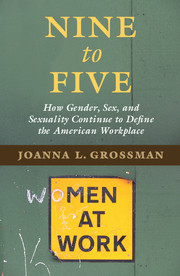Book contents
- Frontmatter
- Dedication
- Contents
- Foreword
- Acknowledgments
- Introduction
- PART I WHAT IS SEX DISCRIMINATION?
- PART II SEXUAL HARASSMENT
- 12 Workplace Affairs and Sexual Favoritism
- 13 Lolita at the Office
- 14 Sex Talk in the Writers’ Room
- 15 Sex Behind Bars
- 16 When the Supervisor Bullies Only Women
- 17 The Equal Opportunity Harasser
- 18 Periodontal Perils
- 19 Punishing Effeminacy
- 20 Late-Night Affairs with David Letterman
- 21 Why Herman Cain Has Not Been Able to Talk His Way Out of His Exploding Sexual Harassment Scandal
- 22 Why Hostile Environment Harassment Is a “Continuing Violation”
- 23 When Sexual Extortion Is Successful
- 24 The Consequences of Failing to Complain about Harassment
- 25 Who Is Responsible for Sudden, Severe Harassment?
- 26 Chinks in the Harassment Law Armor
- 27 Do Employer Efforts Prevent Harassment or Just Prevent Liability?
- 28 Who's the Boss?
- 29 Costly Mistakes
- 30 Hands Off the Merchandise
- PART III PREGNANT WOMEN AND MOTHERS AT WORK
- PART IV FEMALE BREADWINNERS AND THE GLASS CEILING
- Conclusion
- Notes
- Index
25 - Who Is Responsible for Sudden, Severe Harassment?
from PART II - SEXUAL HARASSMENT
Published online by Cambridge University Press: 05 May 2016
- Frontmatter
- Dedication
- Contents
- Foreword
- Acknowledgments
- Introduction
- PART I WHAT IS SEX DISCRIMINATION?
- PART II SEXUAL HARASSMENT
- 12 Workplace Affairs and Sexual Favoritism
- 13 Lolita at the Office
- 14 Sex Talk in the Writers’ Room
- 15 Sex Behind Bars
- 16 When the Supervisor Bullies Only Women
- 17 The Equal Opportunity Harasser
- 18 Periodontal Perils
- 19 Punishing Effeminacy
- 20 Late-Night Affairs with David Letterman
- 21 Why Herman Cain Has Not Been Able to Talk His Way Out of His Exploding Sexual Harassment Scandal
- 22 Why Hostile Environment Harassment Is a “Continuing Violation”
- 23 When Sexual Extortion Is Successful
- 24 The Consequences of Failing to Complain about Harassment
- 25 Who Is Responsible for Sudden, Severe Harassment?
- 26 Chinks in the Harassment Law Armor
- 27 Do Employer Efforts Prevent Harassment or Just Prevent Liability?
- 28 Who's the Boss?
- 29 Costly Mistakes
- 30 Hands Off the Merchandise
- PART III PREGNANT WOMEN AND MOTHERS AT WORK
- PART IV FEMALE BREADWINNERS AND THE GLASS CEILING
- Conclusion
- Notes
- Index
Summary
In 1999, Lucianne Walton was working as a pharmaceutical sales representative for Ortho-McNeil Pharmaceutical (“Ortho”). She has sued Ortho for sexual harassment.
Specifically, she alleges that that year, over a two-month period, her supervisor, George Mykytiuk, groped her, fondled her, and repeatedly raped her. While he never explicitly threatened her, she alleges that he committed several of these acts after showing her the gun he kept close at hand.
She says he had the opportunity to harass her in part because much of the company's pharmaceutical sales force works out of home offices, and most contact between supervisors and subordinates takes place on the road or at the supervisor's house. (Most of the alleged incidents, according to Walton, took place at Mykytiuk's home.)
These are obviously extremely serious allegations that deserve to be heard. Sadly, however, this case, Walton v. Johnson & Johnson, will never reach a jury. The trial court granted summary judgment to Ortho. And recently, the U.S. Court of Appeals for the Eleventh Circuit affirmed that ruling.
The Court of Appeals’ opinion dodged several important issues. Among them was the important issue of so-called sudden, severe harassment. The issue is this: Can an employer be held liable for such harassment as long as the victim pursued reasonable avenues of complaint? Or is the employer off the hook for all the harassment if it took reasonable measures to prevent it from happening, and reasonable measures to correct it afterward?
Put another way, who should pay the price for “unavoidable” harassment – the victim or the employer?
EMPLOYER LIABILITY UNDER FARAGHER AND ELLERTH
The new scheme for assessing employer liability for sexual harassment, set forth in Faragher v. City of Boca Raton and Burlington Industries v. Ellerth, came from a set of logical impulses. The employer should be liable for all acts of its supervisors if they were aided by the power the employer had given them to control their subordinates. After all, the fact that the boss is the boss means that he can force contact with the victim, make his conduct more threatening, make the victim's submission more likely, and make her filing a complaint less likely.
- Type
- Chapter
- Information
- Nine to FiveHow Gender, Sex, and Sexuality Continue to Define the American Workplace, pp. 146 - 150Publisher: Cambridge University PressPrint publication year: 2016



